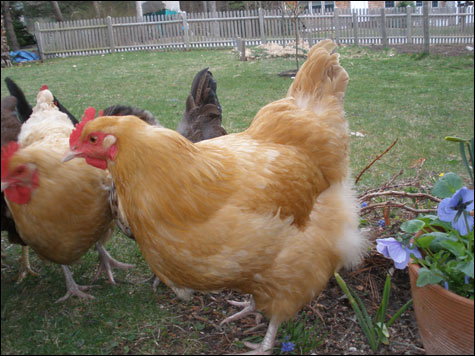
URBAN CHICKENS They get plenty of time in the yard. |
Six-year-old Fuchsia Harmon races around the soggy backyard rounding up the family's flock of chickens. "This has been a great experience for her too," says her mom, Jodi Moger, who raised these chickens from chicks, living in a box in her kitchen.
It's been two years since Portland permitted city dwellers to raise a maximum of six egg-laying chickens. To date, 21 licenses have been issued for a $25 yearly fee. "I'm surprised more people don't have chickens," says Moger. "It's been a fairly seamless integration into our lives and it's not a huge amount of work." The family built a coop against the back wall of their garage and cut a small hole leading to a fenced-in area in their backyard. The chickens come out of the coop in the morning, the family collects eggs, scoops out the coop, makes sure "the ladies" have enough water and grain, and puts them back in at night.
This family raises three different breeds: barred rocks, black giants, and buff orpingtons. These chickens are nearly two years old now and approaching the end of their peak laying years. The family will have to decide whether to keep them or get younger chickens, a difficult decision for animals that seem more like pets than livestock. "When they hear the car door shut, they all come running to the front of the pen and talk to me. They're very endearing and personable," Moger says.
Knowing where their food comes from is an important part of this family's approach to food security — and raising chickens on their double-sized lot in Portland has been a big part of that effort. "The idea is to be self-reliant, not self-sufficient, so we do as much as we can," says her husband, Glenn Harmon. The family has a large garden and a greenhouse, which allows them to grow nearly all their salad greens, year-round. Composting is an important part of the process and chicken poop adds critical nutrients for the garden. The chickens eat food scraps (except for avocados, dry beans, and raw potatoes) in addition to organic chicken feed.
Raising chickens may not be difficult or overly time consuming, but it's certainly a commitment, says Stacey Collins, who teaches classes on raising chickens in the city, offers private consultations, and maintains the mainebackyardharvest.com website. People do need to know what they're getting into.
For example, small coops are sufficient for chickens in rural areas because they're outside most of the time, roaming and foraging freely. However, in cities, chickens spend more time being confined. "Chickens have an ingrained need to forage and if they are kept in a coop they don't have a way to satisfy that need and they'll start pecking each other," Collins says.
Therefore, it's important to keep them entertained. "When there's less space, you have to work harder to keep them occupied," she says. She frequently gives her flock fresh straw and fall leaves to play with; some clients have hung a head of cabbage on a string for them to peck.
In addition to daily chores, it's important for chicken owners to consider who will take care of the chickens when they're away and what to do when chickens get sick. There are only a few local vets who will see chickens and it's expensive, says Collins.